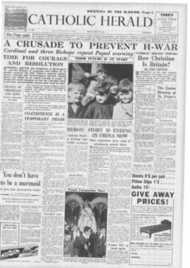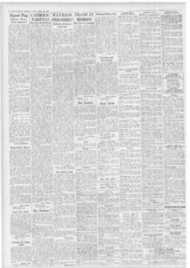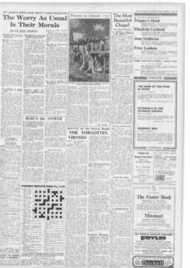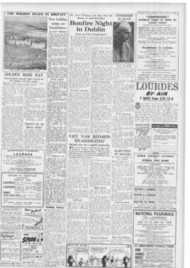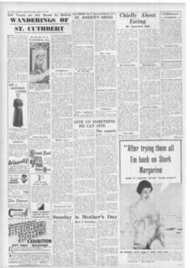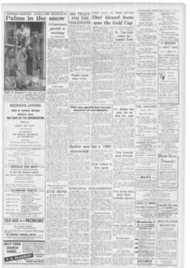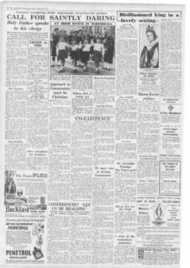Page 3, 18th March 1955
Page 3
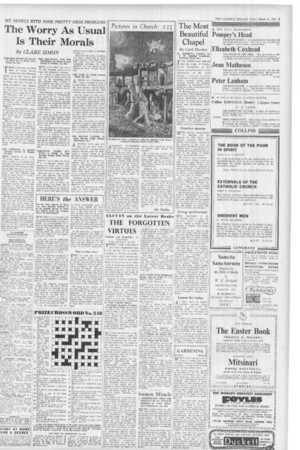
Report an error
Noticed an error on this page?If you've noticed an error in this article please click here to report it.
Tags
Share
Related articles
The Problem Of Faith Today
Finding Out About St. Thomas
Prudence Need Not Be Dull
Professor's Meditation On
In Search A Prophet In The Of Youth Mould Of
Fortitude and Temperance, by Josef Pieper
(Faber and Faber. Ins. 6d.)
THERE is little doubt that if -Athe word temperance were to be thrown out in general company in Britain, the association which would immediately arise in the minds of those who heard it, would be one or other of the 33 temperance societies, the reference hooks list, or temperance societies in general. Not one in ten world think of the fourth of the great cardinal, hinge virtues of the Christian life. Prudence, of course, would fare as badly if not worse, and Justice and Fortitude. while being recognised as virtues, perhaps. would be of our debased modern coinage. Dr. Pieper. the outstanding German Christian and Catholic philosopher needs no introduction to readers of this column. Only recently it was our pleasure to review and forthrightly recommend his What Catholics Believe. His Leisure the Basis of Culture, and The End of Time have already reached a wide and appreciative audience here in Britain. It is to he hoped that this most recent hook. despite its title revealing preoccupation with virtue, will have as wide and as general a readership. For this is the work of a penetrating. integral. Christian mind speaking the ancient truths in the modern idiom.
NO better introduction to this distinctive work could be given than Dr. Pieper's own. This is how he explains why as a professional philosopher he comes to give such deep consideration to these two virtues:
" An erroneous or defective interpretation of the reality of existence inevitably gives rise to false
goals and faulty ideals . . . ..True to this general law, enlightened liberalism-this wide spread and intricate, yet fundamentally uniform network of misinterpretations of the objective reality of man, which has stamped with its distinctive mark the century now gradually falling into the irretrievable past-inevitably produced a disastrous distortion of the idea of ethical man. This distortion falsifies and deprives of their reality the very concepts in which Western Christianity has come to summarize the due and proper image of man: prudence, justice, fortitude, and temperance." Dr. Pieper goes on to show that the foundation in reality, without which neither fortitude nor temTerence can be thought of as virtues, is the " metaphysical fact of the existence of evil " in " the world of men " and " in the world of spirits '' and in the form of guilt and punishment. Enlightened liberalism closed "its eyes to the evil in the world: to the demonic power of ' our adversary.' the Devil. The Evil One; as well as to the mysterious power of human delusion and perversion of will."
So it was, points out Dr. Pieper, that temperance became merely
moderation. and Fortitude merely being true to oneself; and the word morality itself " acquired an ironic andderogatory connotation." and moralism " is used in a wholly pejorative sense. He then goes on to define his object as to " disclose the true significance of human fortitude as a virtue, that is, its Christian significance." Dr. Pieper may claim " no originality of thought." and make good in the 13 pages of notes and references the claim that every sentence could he documented from St. Thomas. but he must allow that the mode of presentation is wholly original, fresh, and compelling in its lucidity. Only once or twice did one feel that it would have been well if a Catholic, trained " theological eye." had been allowed to rove over the translation by Daniel F. Coogan: " The Church Father St. Cyprian," for instance, sounds a bit odd.
OUR NEGLECTED HERITAGE Hymns and the Faith, by Erik Routley. WD., D,Phil.
(John Murray. 21s,)
ONI.Y a few weeks ago the wellknown portrait painter Simon Elwes had it protest on the front page of this newspaper against the dreary wailing of a hymn in the Cathedral. If it had only been a protest, I should not now recall it.
But it was not.
It was a strong, and wellfounded plea for us Catholic Englishmen to accept our goodly inheritance. to use it. and enjoy it; for, as he said, we English have written. and sing. and enjoy sing. jog. some of the very bes; hymns that have ever been composed-but not in our own churches. There we have the " wailing" of which he complained. There recently appeared a second book by Dr. Erik Routley on English hymns, complementing his Hymns and Human Life. It gives point to this plea for us to take over our true inheritance. It is called Hymns and the Faith.
It takes 49 popular hymns and comments on the spiritual message and the teaching of the hymns. The choice is sure. and indisputable; the commentary is excellent, and the hook wholly to be commended for its sincerity and its Christian integrity.
There is not one hymn in this collection which is not wholly Christian (therefore Catholic) in its teaching. There is not one hymn to which exception could be taken on doctrinal grounds. And, added to that, and 1 hope the author will forgive me, there are several in which the full meaning can only be realised when they are sung by whole Christians making
m
no protest, dissenting from no doctrine, by-in other wordsCatholics.
Sermon Miracle
A CHRISTOLOGY FROM THE SERMONS OF ST. VINCENT FERRER. by S.M.C. (Blackfriars Publications, 12s. 6d.i.
WHEN sermon notes over 600 years old find a new selector, editor, and translator there must be something pretty unusual about the sermon notes. In this case, of course, there is; not only was the original preacher one of the great Saints of Christendom, he was and is the very legend of a successful preacher. For clear form and plan these sermon notes remain a model. St. Vincent told his thousands the points he was going to make, he made them clearly with ample scriptural illustration. and concisely, and then he stopped. Miracles of sermons, and sermon miracles, indeed.
blog comments powered by Disqus


